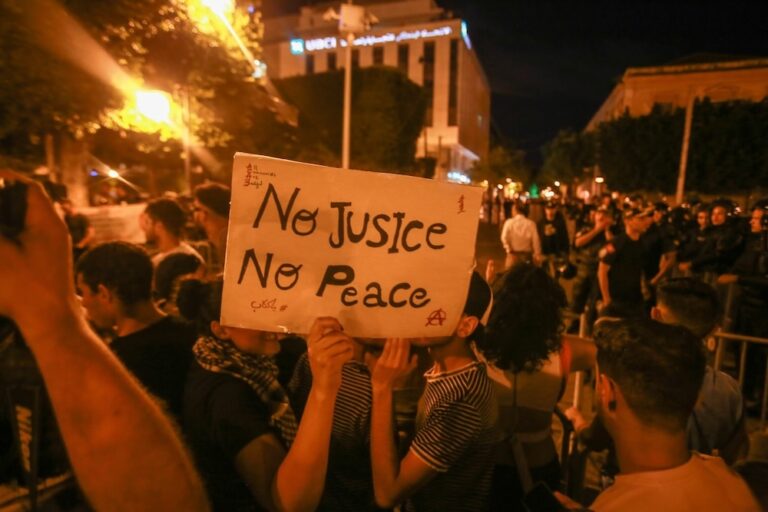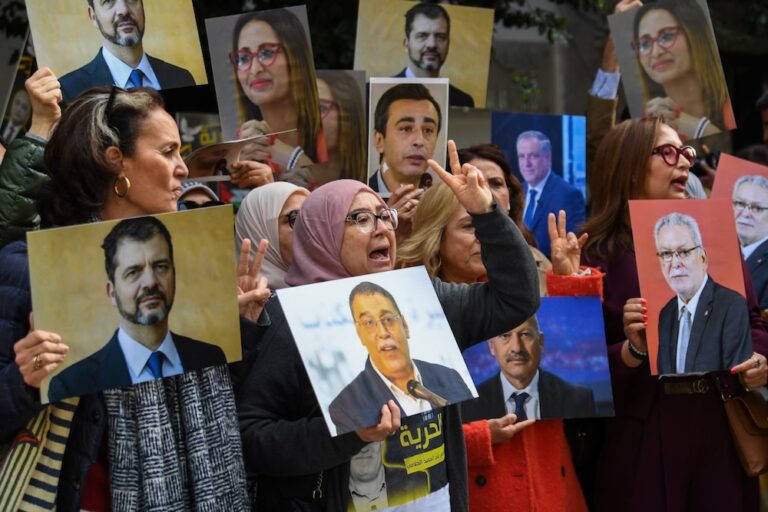(CPJ/IFEX) – The following is a CPJ briefing on Tunisia: May 1999 TUNISIA: A DECADE OF STIFLING THE PRESS A CPJ BRIEFING On May 3, 1999, World Press Freedom Day, the Committee to Protect Journalists, for the second consecutive year, named Tunisian President Zine Abdine Ben Ali as one of the world’s top 10 Enemies […]
(CPJ/IFEX) – The following is a CPJ briefing on Tunisia:
May 1999
TUNISIA: A DECADE OF STIFLING THE PRESS
A CPJ BRIEFING
On May 3, 1999, World Press Freedom Day, the Committee to Protect
Journalists, for the second consecutive year, named Tunisian President Zine
Abdine Ben Ali as one of the world’s top 10 Enemies of the Press. Since
ousting strongman Habib Bourguiba from power in 1987, Ben Ali has helped to
transform Tunisia’s press into one of the most restricted in the Arab world
while overseeing one of the most sophisticated police states in the region.
Tunisian journalists who struggled during Bourguiba’s presidency to maintain
a modicum of independence have seen their hopes dashed under Ben Ali’s
authoritarian rule. Gripped by fear, the press is hobbled by self-censorship
and devoid of substantive news and information. Although private newspapers
exist, they avoid meaningful social or political commentary for fear of
swift reprisal from authorities. Tunisian journalists who dare to veer from
a path of strict self-censorship and have reported on such sensitive topics
as human rights and the activities or viewpoints of the political opposition
have been dismissed from their jobs, denied accreditation, or prevented from
leaving the country. The state has also exerted economic pressure on
newspapers it deems undesirable by withholding vital revenue-producing
advertising. As a result of these policies, Tunisian authorities have little
reason to actively harass or censor journalists; privately owned newspapers
refrain from reporting on even the most benign political issues and have
become virtual carbon copies of the state-controlled press on policy issues.
At the same time, both private and state papers have eagerly engaged in
smear campaigns against political
opposition figures and human rights activists, often depicting them as “sex
maniacs,” “traitors,” or “agents” serving the interests of foreign states.
One of the few Tunisian journalists to defy the authorities in recent years
is Taoufik Ben Brik, who works as a correspondent for several European
newspapers including the Paris-based daily La Croix. Ben Brik has been the
frequent target of harassment for his coverage of sensitive domestic issues.
He has been prevented from leaving the country and interrogated by
authorities about his reporting. In January, his wife’s automobile was
vandalized by a group of thugs, and his telephone lines have been regularly
interrupted.
Foreign correspondents have also experienced the Tunisian government’s
intolerance for independent coverage of domestic issues. Since 1991, four
have been expelled from the country as a result of their reporting.
Authorities have threatened to expel correspondents or close their news
agencies’ offices to discourage unwanted news coverage.
Authorities have also systematically censored foreign publications entering
the country. Hundreds of editions of newspapers such as the French-language
Le Monde and Liberation and the London-based daily Al-Quds al-Arabi have
been banned for their unfavorable coverage of Tunisia. And authorities,
according to Tunisian journalists, have blocked access to websites-including
those of CPJ and Amnesty International-offering information critical of the
country’s dismal rights record.
Indicative of the overall climate for the press, the Paris-based World
Association of Newspapers decided on June 4, 1997, to expel the Tunisian
Association of Newspaper Editors for its failure to condemn government
violations of press freedom.
Despite the woeful state of press freedom in Tunisia, U.S. politicians and
government officials frequently downplay the country’s human rights
violations and stress its role as a strong regional ally and as a model for
economic development. During a recent trip by a U.S. congressional
delegation to Tunis, Congressman Earl Hilliard (D-Alabama) was quoted as
saying that President Ben Ali is a statesman who has “done a tremendous job
in Tunisia and who is well respected back home as well as here in the Arab
world.”
The following materials on Tunisia’s ongoing repression of the press are
available from CPJ:
An article titled “Enough is Enough,” written by a Tunisian journalist,
describing the restrictive environment for journalists in Tunisia;
CPJ’s 1998 report on press freedom in Tunisia;
A chronology of attacks on the press in Tunisia, documented by CPJ since
1992;
CPJ’s 1999 10 Enemies of the Press;
CPJ’s April 30, 1999, letter to President Ben Ali, protesting the
authorities’ continued harassment of journalist Taoufik Ben Brik.


